新概念英语第一册课文翻译及学习笔记Lesson101
- 格式:docx
- 大小:37.71 KB
- 文档页数:3
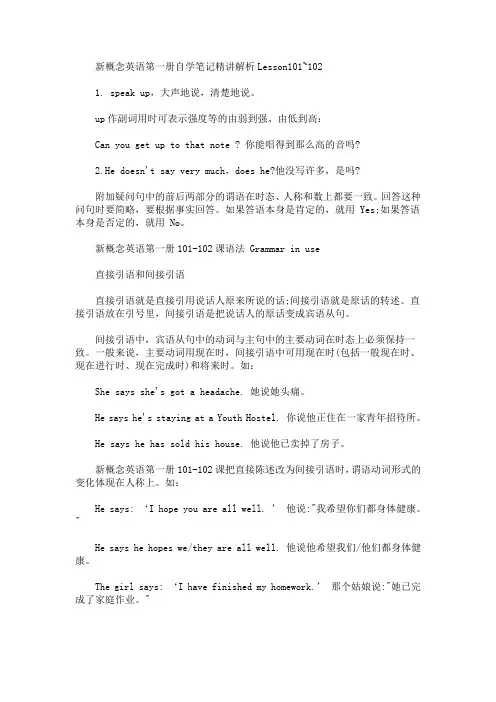
新概念英语第一册自学笔记精讲解析Lesson101~1021. speak up,大声地说,清楚地说。
up作副词用时可表示强度等的由弱到强、由低到高:Can you get up to that note ? 你能唱得到那么高的音吗?2.He doesn't say very much,does he?他没写许多,是吗?附加疑问句中的前后两部分的谓语在时态、人称和数上都要一致。
回答这种问句时要简略,要根据事实回答。
如果答语本身是肯定的,就用 Yes;如果答语本身是否定的,就用 No。
新概念英语第一册101-102课语法 Grammar in use直接引语和间接引语直接引语就是直接引用说话人原来所说的话;间接引语就是原话的转述。
直接引语放在引号里,间接引语是把说话人的原话变成宾语从句。
间接引语中,宾语从句中的动词与主句中的主要动词在时态上必须保持一致。
一般来说,主要动词用现在时,间接引语中可用现在时(包括一般现在时、现在进行时、现在完成时)和将来时。
如:She says she's got a headache. 她说她头痛。
He says he's staying at a Youth Hostel. 你说他正住在一家青年招待所。
He says he has sold his house. 他说他已卖掉了房子。
新概念英语第一册101-102课把直接陈述改为间接引语时,谓语动词形式的变化体现在人称上。
如:He says: ‘I hope you are all well. ’ 他说:"我希望你们都身体健康。
"He says he hopes we/they are all well. 他说他希望我们/他们都身体健康。
The girl says: ‘I have finished my homework.’ 那个姑娘说:"她已完成了家庭作业。
"The girl says that she has finished her homework. 那个姑娘说她已完成了家庭作业。
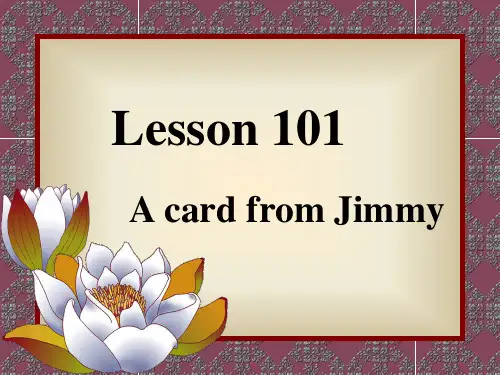

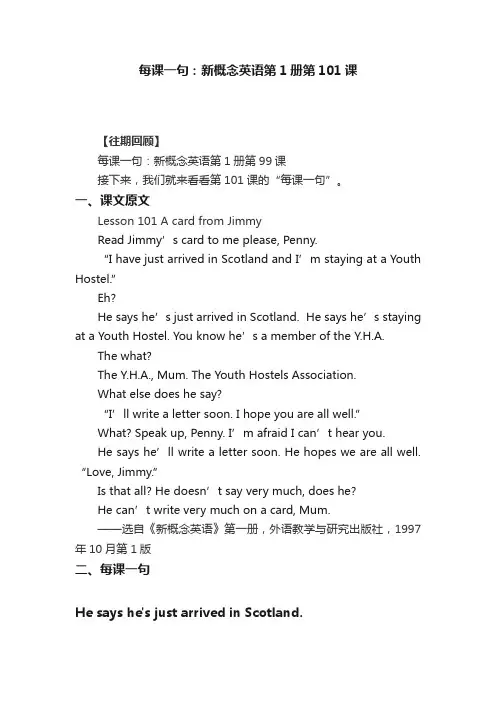
每课一句:新概念英语第1册第101课【往期回顾】每课一句:新概念英语第1册第99课接下来,我们就来看看第101课的“每课一句”。
一、课文原文Lesson 101 A card from JimmyRead Jimmy’s card to me please, Penny.“I have just arrived in Scotland and I’m staying at a Youth Hostel.”Eh?He says he’s just arrived in Scotland.He says he’s staying at a Youth Hostel. You know he’s a member of the Y.H.A.The what?The Y.H.A., Mum. The Youth Hostels Association.What else does he say?“I’ll write a letter soon. I hope you are all well.”What? Speak up, Penny. I’m afraid I can’t hear you.He says he’ll write a letter soon. He hopes we are all well. “Love, Jimmy.”Is that all? He doesn’t say very much, does he?He can’t write very much on a card, Mum.——选自《新概念英语》第一册,外语教学与研究出版社,1997年10月第1版二、每课一句He says he's just arrived in Scotland.本课继续学习宾语从句的用法,只是本课侧重学习的都是间接引语的用法。
对于间接引语,关键要掌握直接引语转为间接引语的几个变化原则。
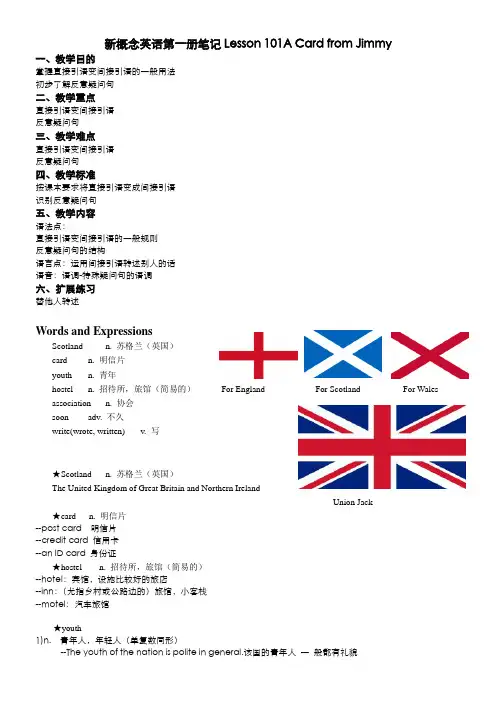
新概念英语第一册笔记Lesson 101A Card from Jimmy一、教学目的掌握直接引语变间接引语的一般用法初步了解反意疑问句二、教学重点直接引语变间接引语反意疑问句三、教学难点直接引语变间接引语反意疑问句四、教学标准按课本要求将直接引语变成间接引语识别反意疑问句五、教学内容语法点:直接引语变间接引语的一般规则反意疑问句的结构语言点:运用间接引语转述别人的话语音:语调-特殊疑问句的语调六、扩展练习替他人转述Words and ExpressionsScotland n. 苏格兰(英国)card n. 明信片youth n. 青年hostel n. 招待所,旅馆(简易的)For England For Scotland For Wales association n. 协会soon adv. 不久write(wrote, written) v. 写★Scotland n. 苏格兰(英国)The United Kingdom of Great Britain and Northern IrelandUnion Jack ★card n. 明信片--post card 明信片--credit card 信用卡--an ID card 身份证★hostel n. 招待所,旅馆(简易的)--hotel:宾馆,设施比较好的旅店--inn:(尤指乡村或公路边的)旅馆,小客栈--motel:汽车旅馆★youth1)n. 青年人,年轻人(单复数同形)--The youth of the nation is polite in general.该国的青年人一般都有礼貌2)青年(少年)时期,青春时期-- He spent his youth in the U.S.A 他少年时代在美国度过--He studied Italian in his youth. 他年轻时学过意大利语。
3)青春--She lost her youth. 她青春不再--She kept her youth. 她青春依旧★association n. 协会--My father was the president of the dental association.我父亲是牙医协会的会长。
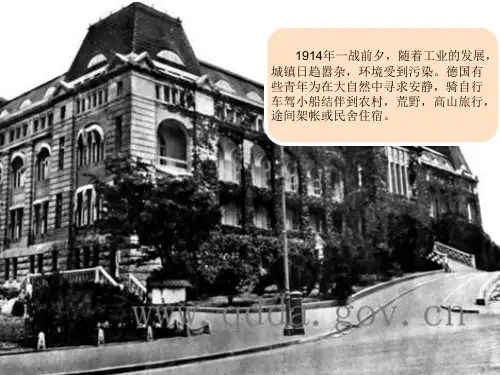
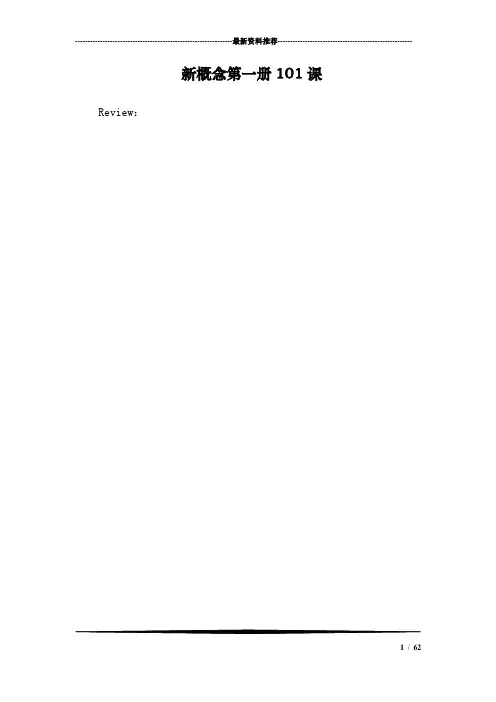
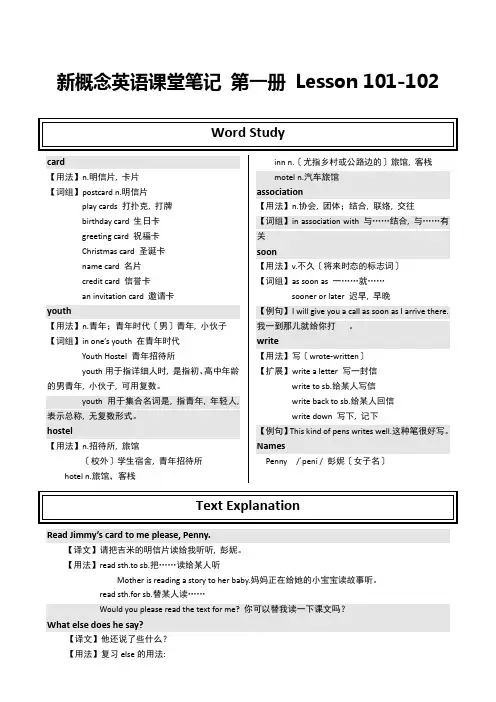
新概念英语课堂笔记第一册Lesson 101-102card【用法】n.明信片, 卡片【词组】postcard n.明信片play cards 打扑克, 打牌birthday card 生日卡greeting card 祝福卡Christmas card 圣诞卡name card 名片credit card 信誉卡an invitation card 邀请卡youth【用法】n.青年;青年时代〔男〕青年, 小伙子【词组】in one’s youth 在青年时代Youth Hostel 青年招待所youth用于指详细人时, 是指初、高中年龄的男青年, 小伙子, 可用复数。
youth用于集合名词是, 指青年, 年轻人, 表示总称, 无复数形式。
hostel【用法】n.招待所, 旅馆〔校外〕学生宿舍, 青年招待所hotel n.旅馆,客栈inn n.〔尤指乡村或公路边的〕旅馆, 客栈motel n.汽车旅馆association【用法】n.协会, 团体;结合, 联络, 交往【词组】in association with 与……结合, 与……有关soon【用法】v.不久〔将来时态的标志词〕【词组】as soon as 一……就……sooner or later 迟早, 早晚【例句】I will give you a call as soon as I arrive there.我一到那儿就给你打。
write【用法】写〔wrote-written〕【扩展】write a letter 写一封信write to sb.给某人写信write back to sb.给某人回信write down 写下, 记下【例句】This kind of pens writes well.这种笔很好写。
NamesPenny /ˈpeni / 彭妮〔女子名〕Read Jimmy’s card to me please, Penny.【译文】请把吉米的明信片读给我听听, 彭妮。
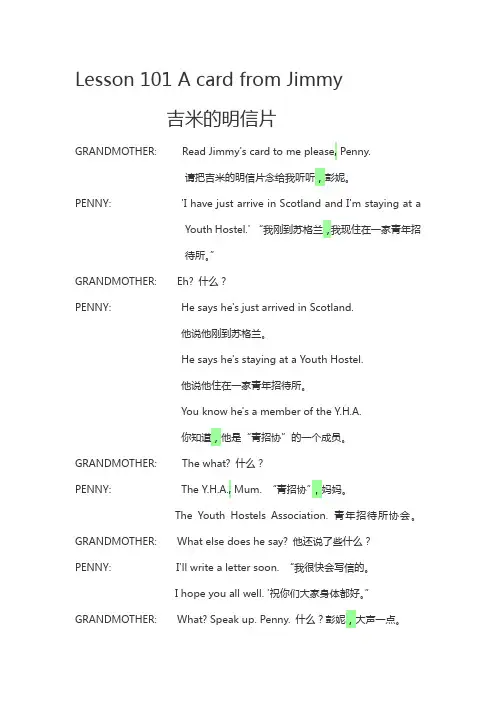
Lesson 101 A card from Jimmy吉米的明信片GRANDMOTHER: Read Jimmy's card to me please, Penny.请把吉米的明信片念给我听听,彭妮。
PENNY: 'I have just arrive in Scotland and I'm staying at aYouth Hostel.' “我刚到苏格兰,我现住在一家青年招待所。
”GRANDMOTHER: Eh? 什么?PENNY: He says he's just arrived in Scotland.他说他刚到苏格兰。
He says he's staying at a Youth Hostel.他说他住在一家青年招待所。
You know he's a member of the Y.H.A.你知道,他是“青招协”的一个成员。
GRANDMOTHER: The what? 什么?PENNY: The Y.H.A., Mum. “青招协”,妈妈。
The Youth Hostels Association. 青年招待所协会。
GRANDMOTHER: What else does he say? 他还说了些什么?PENNY: I'll write a letter soon. “我很快会写信的。
I hope you all well. '祝你们大家身体都好。
”GRANDMOTHER: What? Speak up. Penny. 什么?彭妮,大声一点。
I'm afraid I can't hear you 我可听不见你念的。
PENNY: He say he'll write a letter soon. 他说他很快会写信的。
He hopes we are all well. 他祝我们大家身体好。
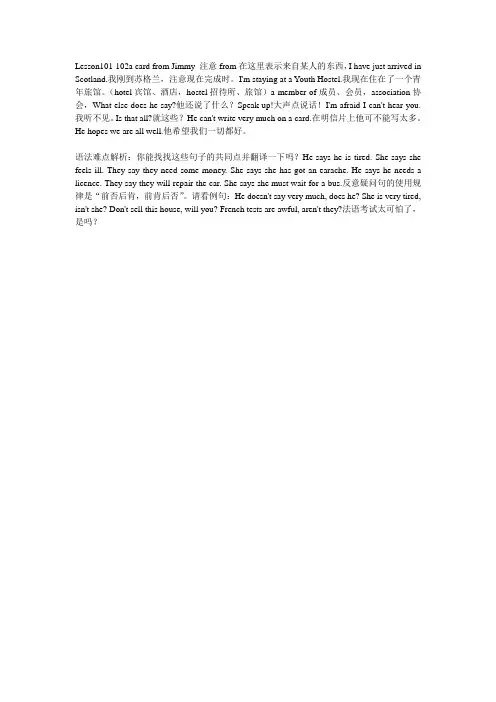
Lesson101-102a card from Jimmy 注意from在这里表示来自某人的东西,I have just arrived in Scotland.我刚到苏格兰,注意现在完成时。
I'm staying at a Youth Hostel.我现在住在了一个青年旅馆。
(hotel宾馆、酒店,hostel招待所、旅馆)a member of成员、会员,association协会,What else does he say?他还说了什么?Speak up!大声点说话!I'm afraid I can't hear you.我听不见。
Is that all?就这些?He can't write very much on a card.在明信片上他可不能写太多。
He hopes we are all well.他希望我们一切都好。
语法难点解析:你能找找这些句子的共同点并翻译一下吗?He says he is tired. She says she feels ill. They say they need some money. She says she has got an earache. He says he needs a licence. They say they will repair the car. She says she must wait for a bus.反意疑问句的使用规律是“前否后肯,前肯后否”。
请看例句:He doesn't say very much, does he? She is very tired, isn't she? Don't sell this house, will you? French tests are awful, aren't they?法语考试太可怕了,是吗?。
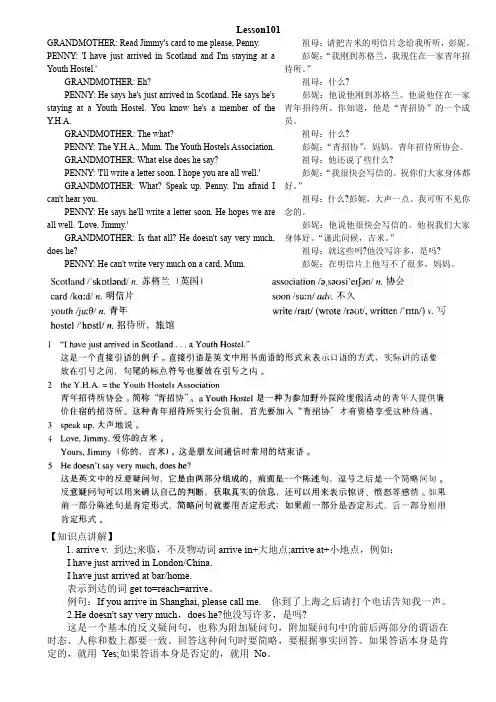
【知识点讲解】1. arrive v. 到达;来临,不及物动词arrive in+大地点;arrive at+小地点,例如: I have just arrived in London/China. I have just arrived at bar/home.表示到达的词get to=reach=arrive 。
例句:If you arrive in Shanghai, please call me. 你到了上海之后请打个电话告知我一声。
2.He doesn't say very much ,does he?他没写许多,是吗?这是一个基本的反义疑问句,也称为附加疑问句,附加疑问句中的前后两部分的谓语在时态、人称和数上都要一致。
回答这种问句时要简略,要根据事实回答。
如果答语本身是肯定的,就用 Yes;如果答语本身是否定的,就用 No 。
Lesson101GRANDMOTHER: Read Jimmy's card to me please, Penny. PENNY: 'I have just arrived in Scotland and I'm staying at a Youth Hostel.'GRANDMOTHER: Eh?PENNY: He says he's just arrived in Scotland. He says he's staying at a Youth Hostel. You know he's a member of the Y .H.A.GRANDMOTHER: The what?PENNY: The Y.H.A., Mum. The Youth Hostels Association. GRANDMOTHER: What else does he say?PENNY: 'I'll write a letter soon. I hope you are all well.' GRANDMOTHER: What? Speak up. Penny. I'm afraid I can't hear you.PENNY: He says he'll write a letter soon. He hopes we are all well. 'Love, Jimmy.'GRANDMOTHER: Is that all? He doesn't say very much, does he?PENNY: He can't write very much on a card, Mum.祖母:请把吉米的明信片念给我听听,彭妮。
Lesson 101write [ ] wrote [ ] written [ ]1.Read Jimmy’s card to me , Penny.read后面接了两个宾语,一个是Jimmy’s card ,一个是me,所以,这句话还可以这样来说:Read me Jimmy’s card please.2.直接引语和间接引语“I have just arrived in Scotland and I’m staying at a Youth Hostel.”这是一个直接引语的例子。
直接引语是英文中用书面语的形式来表示口语的方式,实际的话要放在引号之间,句尾的标点符号也要放在引号之内。
下面三句都属于间接引语:He says he’s just arrived in Scotland.He says he’s staying at a Youth Hostel.He says he’ll write a letter soon.3. the Y.H.A.=the Youth Hostels Association青年招待所协会。
简称“青招协”。
the Youth Hostel是一种为参加野外探险度假活动的青年人提供廉价住宿的招待所。
这种青年招待所实行会员制,首先要加入“青招协”才有资格享受这种待遇。
在组织机构的前面,我们通常要加上定冠词the,例如:the United Nations 联合国the International Olympic Committee 国际奥委会4 .speak up,大声地说。
还可以这样说:Louder , please.5.hear和listen tohear 听见,听到强调的是结果I’m afraid I can’t hear you.listen to 听强调的是动作Listen to me, please.6.下列从句中,都省略了that。
He says he’s just arrived in Scotland.He says he’s staying at a Youth Hostel.He says he’ll write a letter soon.You know he’s a member of the Y.H.A..I’m afraid I can’t hear you.I hope you are all well.He hopes we are all well.7 .Love,Jimmy.爱你的吉米。
新概念英语第一册课文翻译及学习笔记Lesson101【课文】GRANDMOTHER: Read Jimmy's card to me please, Penny.PENNY: 'I have just arrived in Scotland and I'm staying at a Youth Hostel.'GRANDMOTHER: Eh?PENNY: He says he's just arrived in Scotland. He says he's staying at a Youth Hostel. You know he's a member of the Y.H.A.GRANDMOTHER: The what?PENNY: The Y.H.A., Mum. The Youth Hostels Association.GRANDMOTHER: What else does he say?PENNY: 'I'll write a letter soon. I hope you are all well.'GRANDMOTHER: What? Speak up. Penny. I'm afraid I can't hear you.PENNY: He says he'll write a letter soon. He hopes we are all well. 'Love, Jimmy.'GRANDMOTHER: Is that all? He doesn't say very much, does he?PENNY: He can't write very much on a card, Mum.【课文翻译】祖母:请把吉米的明信片念给我听听,彭妮。
新概念英语第一册第101-102课:A card from JimmyLesson 101 A card from Jimmy吉米的明信片Listen to the tape then answer this question.Does Grandmother seem pleased to get a card from Jimmy? Why/Why not?听录音,然后回答问题。
收到吉米寄来的一张明信片,祖母是否显得高兴?为什么/为什么不高兴?Grandmother: Read Jimmy’s card to me please, Penny.祖母:请把吉米的明信片念给我听听,彭妮。
Penny: “I have just arrived in Scotland and I’m staying at a Youth Hostel.”彭妮:“我刚到苏格兰,我现住在一家青年招待所。
”Grandmother: Eh?祖母:什么?Penny: He says he’s just arrived in Scotland. He says he’s staying at a Youth Hostel.You know he’s a member of the Y.H.A.彭妮:他说他刚到苏格兰。
他说他住在一家青年招待所。
你知道,他是“青招协”的一个成员。
Grandmother: The what?祖母:什么?Penny: The Y.H.A., mother. The Youth Hostel’s Association.彭妮:“青招协”,妈妈。
青年招待所协会。
Grandmother: What else does he say?祖母:他还说了些什么?Penny: “I’ll write a letter soon. I hope you are all well.”彭妮:“我很快会写信的。
祝你们大家身体都好。
新概念英语第一册课文翻译及学习笔记Lesson101【课文】
GRANDMOTHER: Read Jimmy's card to me please, Penny.
PENNY: 'I have just arrived in Scotland and I'm staying at a Youth Hostel.'
GRANDMOTHER: Eh?
PENNY: He says he's just arrived in Scotland. He says he's staying at a Youth Hostel. You know he's a member of the Y.H.A.
GRANDMOTHER: The what?
PENNY: The Y.H.A., Mum. The Youth Hostels Association.
GRANDMOTHER: What else does he say?
PENNY: 'I'll write a letter soon. I hope you are all well.'
GRANDMOTHER: What? Speak up. Penny. I'm afraid I can't hear you.
PENNY: He says he'll write a letter soon. He hopes we are all well. 'Love, Jimmy.'
GRANDMOTHER: Is that all? He doesn't say very much, does he?
PENNY: He can't write very much on a card, Mum.
【课文翻译】
祖母:请把吉米的明信片念给我听听,彭妮。
彭妮:“我刚到苏格兰,我现住在一家青年招待所。
”
祖母:什么?
彭妮:他说他刚到苏格兰。
他说他住在一家青年招待所。
你知道,他是“青招协”的一个成员。
祖母:什么?
彭妮:“青招协”,妈妈。
青年招待所协会。
祖母:他还说了些什么?
彭妮:“我很快会写信的。
祝你们大家身体都好。
”
祖母:什么?彭妮,大声一点。
我可听不见你念的。
彭妮:他说他很快会写信的。
他祝我们大家身体好。
“谨此问候,吉米。
”
祖母:就这些吗?他没写很多,是吗?
彭妮:在明信片上他写不了很多,妈妈。
【生词】
Scotland n. 苏格兰(英国)
card n. 明信片
youth n. 青年
hostel n. 招待所,旅馆
association n. 协会
soon adv. 不久
write (wrote, written) v. 写
【知识点讲解】
1. arrive v. 到达;来临
这个词是不及物动词,arrive in+大地点;arrive at+小地点,例如:
I have just arrived in London/China.
I have just arrived at bar/home.
表示到达的词get to=reach=arrive。
例句:If you arrive in Shanghai, please call me.
你到了上海之后请打个电话告知我一声。
2.He doesn't say very much,does he?他没写很多,是吗?
这是一个基本的反义疑问句,也称为附加疑问句,附加疑问句中的前后两部分的谓语在时态、人称和数上都要一致。
回答这种问句时要简略,要根据事实回答。
如果答语本身是肯定的,就用 Yes;如果答语本身是否定的,就用 No。